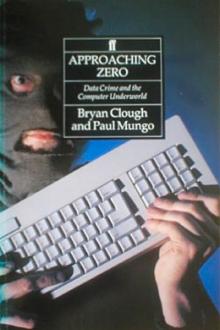The Kidnap Years: by David Stout (popular books of all time TXT) 📗

- Author: David Stout
Book online «The Kidnap Years: by David Stout (popular books of all time TXT) 📗». Author David Stout
Journalists’ treatment of Hoover in the 1930s seems remarkable, considering that he never subjected himself to the give-and-take of a news conference. (If he had, his volcanic temper might have erupted, since Hoover never learned to tolerate criticism. Years later, when he heard that the columnist Jack Anderson, whom he detested, might be preparing to write something unflattering, Hoover told associates that Anderson was “a flea-ridden dog” with a mind “lower than the regurgitated filth of vultures.” On another occasion, Hoover told a confidant that Anderson was “lower than dog shit.”*****
In the 1930s, some reporters and lawmen had symbiotic relationships of a kind gone forever. If reporters got on the good side of police, they were alerted about raids and perp walks. In return, reporters sometimes wrote about lawmen in prose that smacked of gag-inducing hero worship, at least to my ear. They didn’t write about police brutality, an idea whose time was yet to come.
Hoover has been rightly credited with injecting a degree of professionalism into an agency that had been a haven for incompetents. He oversaw the establishment of a national crime laboratory and instituted scientific methods still relied upon by police agencies. But early on, some of his agents were shockingly ignorant of basic investigative techniques.
And Hoover was not averse to more traditional, unsavory policing methods. In recent years, old memoranda in FBI files have surfaced in which the director demanded “physically vigorous” questioning of some suspects. Nor did Hoover and his acolytes shy away from occasional evidence tampering and perjury.
A half century after his death, Hoover remains a creature of baffling contradictions. He expressed Victorian views on sexual behavior (although suspicions about his personal proclivities persisted), yet he reveled in listening to tape recordings of public figures overheard in strange bedrooms. He railed against gangsters and racketeers while long denying the very existence of organized crime.******
And while he warned his agents to take care in their personal relationships lest they create even a whiff of embarrassment for the bureau, he was a familiar and very public figure at the Stork Club, the Midtown Manhattan nightclub frequented by gossips, glitterati, and gangsters. The club was owned by Sherman Billingsley, an ex-bootlegger, and one of its most prominent regulars was Walter Winchell, the immensely popular gossip columnist of the era who promoted Hoover’s image and got occasional scoops in return. And Hoover wasn’t above turning to shady figures for tips on which horse races might be fixed. (Betting on the ponies was one of his pleasures.)
It is not too much to say that while he expressed hatred for criminals, Hoover needed them—killers, bank robbers, and kidnappers—as targets for the national police force he was creating. And he did build a national police force, something that probably would have horrified the Founding Fathers, for better and worse.
In the early 1980s, when I was a journalist at the Record newspaper in New Jersey, there was a resurgence of interest in the Lindbergh kidnapping. The widow of Bruno Hauptmann, the man who was convicted of kidnapping and killing the Lindbergh baby and was executed in 1936, sued in federal court in a vain attempt to show that her husband was innocent.
Her suit went nowhere. But it brought a spirited response from David Wilentz, who was a fiery little bantam rooster of a prosecutor in 1935 when he convicted Hauptmann. Well into his senior years at the time of the widow’s suit but in possession of all his wits, Wilentz rebutted the widow point by point. He said he had never doubted Hauptmann’s guilt.
I lived in Englewood, New Jersey, from 1977 to 1987. My house was near a school that was once the mansion of Dwight Morrow, the banker, U.S. senator, and one-time ambassador to Mexico who was Charles Lindbergh’s father-in-law.
My backyard abutted Brookside Cemetery. Every time I let my dogs out, they rushed to the cemetery fence and barked, as if to chase away ghosts. I found out later that Brookside is the resting place of Dwight Morrow and of a maid in the Morrow household who took her own life when she came under suspicion, unjustly it seems, soon after the Lindbergh baby was kidnapped.
Ghosts?
I don’t believe in ghosts, or I don’t think I do. Then again…
The more I have dug into the past, the more people I have found who deserve to be rescued from obscurity. They were not just pawns in Hoover’s power games, not just stick figures in the purple prose of journalists of the time. Some of the people rest in manicured cemeteries, others in paupers’ fields. For some, their ashes are sealed in urns or were scattered at sea.
When you gaze at photographs in newspaper microfilm from back then, the people are frozen in time, yet they almost seem alive again. Radiant brides on the society pages. Kindergarten children with crayons. A family huddled around the living room radio, ready to listen to—what? A detective story? One of Franklin Roosevelt’s fireside chats? News of omens of war in Europe and the Orient?
Or perhaps there is news of yet another robbery or kidnapping or murder. One doesn’t have to search hard to find images of grim-faced cops wearing rumpled suits and weary faces.
Even the children in the photographs are dead now or very old and frail. Their elders are all long gone, including the kidnapping victims and their abductors, cops and prosecutors. Gone, too, are the reporters and photographers who chronicled life back then, sometimes becoming actual players in kidnapping dramas in ways that seem inconceivable today.
As I said, I traveled back in time to meet the people in this book. I just had





Comments (0)